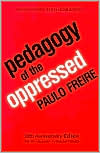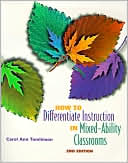Pedagogy of the Oppressed
First published in Portuguese in 1968, Pedagogy of the Oppressed was translated and published in English in 1970. The methodology of the late Paulo Freire has helped to empower countless impoverished and illiterate people throughout the world. Freire's work has taken on especial urgency in the United States and Western Europe, where the creation of a permanent underclass among the underprivileged and minorities in cities and urban centers is increasingly accepted as the norm. With a...
Search in google:
On the 20th anniversary of its publication, this classic manifesto is updated with an important new preface by the author. Freire reflects on the impact his book has had, and ... Booknews Reprint of the 1970 classic with a new introduction and bibliography (of 16 p.) by Donaldo Macedo and foreword (6 p.) by Richard Shaull. Annotation c. Book News, Inc., Portland, OR (booknews.com)
Publisher's Foreword9Foreword11Preface17Ch. 1The justification for a pedagogy of the oppressed; the contradiction between the oppressors and the oppressed, and how it is overcome; oppression and the oppressors; oppression and the oppressed; liberation: not a gift, not a self-achievement, but a mutual process.25Ch. 2The "banking" concept of education as an instrument of oppression - its presuppositions - a critique; the problem-posing concept of education as an instrument for liberation - its presuppositions; the "banking" concept and the teacher-student contradiction; the problem-posing concept and the supersedence of the teacher-student contradiction; education: a mutual process, world-mediated; people as uncompleted beings, conscious of their incompletion, and their attempt to be more fully human.52Ch. 3Dialogics - the essence of education as the practice of freedom; dialogics and dialogue; dialogue and the search for program content; the human-world relationship, "generative themes," and the program content of education as the practice of freedom; the investigation of "generative themes" and its methodology; the awakening of critical consciousness through the investigation of "generative themes"; the various stages of the investigation.68Ch. 4Antidialogics and dialogics as matrices of opposing theories of cultural action: the former as an instrument of oppression and the latter as an instrument of liberation; the theory of antidialogical action and its characteristics: conquest, divide and rule, manipulation, and cultural invasion; the theory of dialogical action and its characteristics: cooperation, unity, organization, and cultural synthesis.106
\ BooknewsReprint of the 1970 classic with a new introduction and bibliography (of 16 p.) by Donaldo Macedo and foreword (6 p.) by Richard Shaull. Annotation c. Book News, Inc., Portland, OR (booknews.com)\ \








